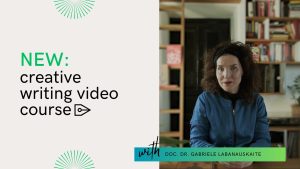LITERARY MENTORING
“So okay – there you are in your room with the shade down and the door shut and the plug pulled out of the base of telephone. You’ve blown up your TV and committed yourself to a thousand words a day, come hell or high water. Now comes the big question: What are you going to write about? And the equally big answer: Anything you damn well want.”
Stephen King, On Writing: A Memoir of the Craft
Literary mentoring is designed for individual learning following a tailor-made curriculum at the convenient time. These individual consultations focus on writers of different types. Some of the former students sought for the basic knowledge of creative writing to start writing in general. Others simply wanted to improve their skills in private.
 Photography: Shelby Miller
Photography: Shelby Miller
Often literary mentoring is necessary for the writers who want to discuss a
particular piece of their work (novel, short story or etc.). They intend to analyse, study and master writing with the help of the professional and the provided theoretical and practical literary knowledge.
⏰Duration of the regular consultation is 1 hour.
FEEDBACK
“I remember taking along a final draft of my latest text to the first literary mentoring consultation. I had a feeling that a story might lack some clarity, so I hoped that Gabrielė could help me edit the text and extract the main idea. I had developed the tendency to wrap the text in a way that it was becoming too complicated to the reader. I noticed it while attending creative writing courses with Gabrielė. She has always been honest and humbly advised me where to focus on, what to unwrap to make a story coherent and clear.
After our first individual meeting I left frustrated. Gabrielė advised me to try to divide my so-called final draft into two stories. I had a different feeling: dividing the narrative in two threatened with the loss of meaning. I had that feeling until I sat down to write. I kept meeting with Gabrielė for mentoring and after a few months I had two stories – ready-to-publish novels.”
Dovilė Raustytė, chief of communication at International Film Festival „Kino pavasaris“, writer
“Gabrielė provides literary mentoring consultations, where she actually embodies the subtle equilibrium. She manages to balance sensitive, empathetic and unconditional support with professional, careful and precise insistence. I think these are the qualities of the real teacher! What fascinates me is that Gabrielė also combines learning process with a game. I had even suprised myself coming to the realisation that this childish approach and the inner hazard enabled me to write hypnotic and profound stories.”
Rosita Pipirienė, psychotherapist
—
❗ For more information contact Gabrielė Labanauskaitė ➡ [email protected]
 Photography: David Iskander
Photography: David Iskander Photography: Yannick Pulver
Photography: Yannick Pulver